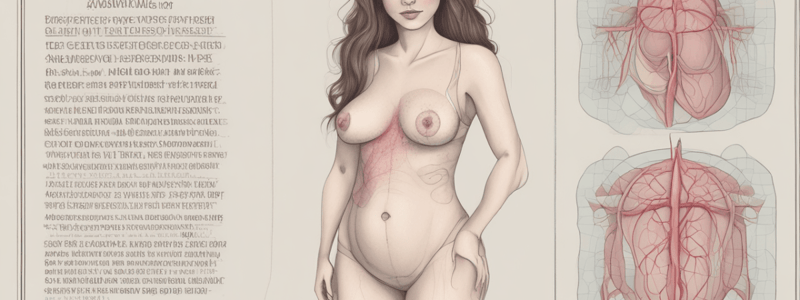Podcast
Questions and Answers
Which of the following is a critical component of assessing a female patient with reproductive system problems?
Which of the following is a critical component of assessing a female patient with reproductive system problems?
- Reviewing her medication list for potential interactions
- Performing a thorough physical examination of the cardiovascular system
- Evaluating her menstrual cycle and pregnancy history (correct)
- Conducting a mental health assessment
Which of the following lifestyle choices is associated with the highest risk of reproductive system problems in males?
Which of the following lifestyle choices is associated with the highest risk of reproductive system problems in males?
- Excessive alcohol consumption
- Smoking (correct)
- Lack of physical activity
- Poor dietary habits
What is the primary rationale for assessing risky lifestyle choices in patients with reproductive system problems?
What is the primary rationale for assessing risky lifestyle choices in patients with reproductive system problems?
- To identify potential health risks associated with lifestyle choices (correct)
- To diagnose underlying medical conditions
- To educate patients on healthy lifestyle habits
- To develop a treatment plan for the reproductive system problem
Which of the following is a common clinical manifestation of reproductive system problems in females?
Which of the following is a common clinical manifestation of reproductive system problems in females?
What is the primary goal of evidence-based nursing and interprofessional management for patients with reproductive system problems?
What is the primary goal of evidence-based nursing and interprofessional management for patients with reproductive system problems?
Study Notes
Reproductive System Problems in Females
- Aetiology: Hormonal imbalances, genetics, infections, and lifestyle factors contribute to reproductive system problems in females.
- Pathophysiology: Disruptions in the hypothalamic-pituitary-ovarian axis can lead to ovulation disorders, polycystic ovary syndrome (PCOS), and endometriosis.
- Clinical Manifestations:
- Abnormal uterine bleeding
- Pelvic pain
- Infertility
- Hirsutism
- Assessment:
- Medical history: Menstrual cycle, sexual function, and fertility
- Physical examination: Pelvic examination, breast examination
- Laboratory tests: Hormone levels, pregnancy test
- Evidence-based Nursing and Interprofessional Management:
- Medications: Hormonal therapies, pain management
- Lifestyle modifications: Weight management, stress reduction
- Surgical interventions: Hysteroscopy, laparoscopy
Reproductive System Problems in Males
- Aetiology: Hormonal imbalances, genetics, infections, and lifestyle factors contribute to reproductive system problems in males.
- Pathophysiology: Disruptions in the hypothalamic-pituitary-testicular axis can lead to hypogonadism, erectile dysfunction, and infertility.
- Clinical Manifestations:
- Erectile dysfunction
- Infertility
- Low libido
- Gynecomastia
- Assessment:
- Medical history: Sexual function, fertility
- Physical examination: Genital examination, testicular examination
- Laboratory tests: Hormone levels, semen analysis
- Evidence-based Nursing and Interprofessional Management:
- Medications: Hormone replacement therapy, phosphodiesterase type 5 inhibitors
- Lifestyle modifications: Healthy diet, regular exercise
- Surgical interventions: Vasectomy reversal, penile implant
Risky Lifestyle Choices and Reproductive Health
- Rationale for assessment: Identifying high-risk behaviors can prevent reproductive health problems.
- Medical Health Risks associated with various lifestyle choices:
- Smoking: Increased risk of infertility, miscarriage, and erectile dysfunction
- Substance abuse: Hormonal imbalances, fertility problems, and increased risk of sexually transmitted infections (STIs)
- Poor diet: Nutritional deficiencies, hormonal imbalances, and obesity-related reproductive problems
- Physical inactivity: Decreased fertility, increased risk of reproductive system cancers
- Unprotected sex: Increased risk of STIs, unintended pregnancy, and cervical cancer
Studying That Suits You
Use AI to generate personalized quizzes and flashcards to suit your learning preferences.
Description
This quiz covers the aetiology, pathophysiology, clinical manifestations, and evidence-based management of reproductive system problems in both females and males. It also explores the importance of assessing risky lifestyle choices.





